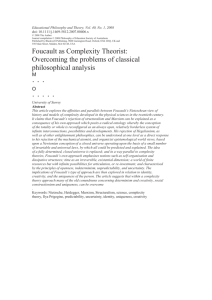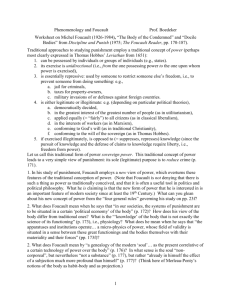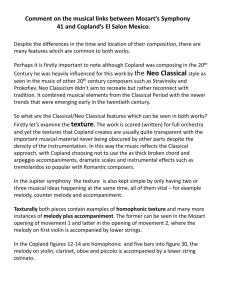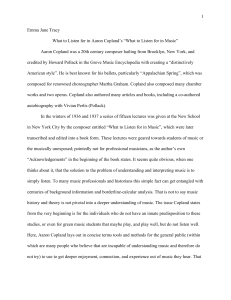Giving lesson observation feedback
advertisement
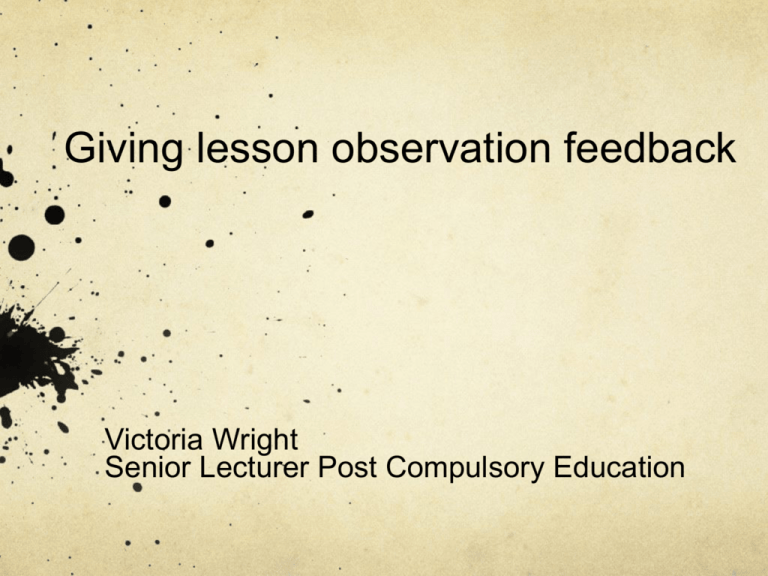
Giving lesson observation feedback Victoria Wright Senior Lecturer Post Compulsory Education Quality observer O’Leary Copland Teacher educator Autoethno -graphy Foucault dialogic CHAT Discourse Subject/s Relations of power Division of Labour: Observer Student Teacher Armstrong (2000, p.4) ‘Quality is in the eye of the beholder. ..All definitions are invariably situated in a context, and a reflection of the interactions between a range of agencies, including the individual learner whose needs and expectations form part of the equation…In short, there is always an ideological as well as an ethical basis to definitions of quality’. Analysis of my observational strategy Regulatory Practice: exploring conventions (university, known/ researched, individual) and patterns/ phases Division of Labour: turn taking, marked interruptions, length of turn, negotiation of action, use of questions Political technology: attitude, values and expectations Contradictions: with conventions, with attitude and values To highlight the context bound nature of giving observation feedback To indicate some of the complexities around fostering a dialogic approach To share ‘the vigilant tension of the self taking care, above all, not to lose control of its representations and be overcome by either pains or pleasures’ (Foucault, 2001, p.534). signposting some references Armstrong, P. (2000) Never mind the quality, measure the length: Issues for Lifelong learning. Supporting Lifelong Learning Global Colloquium. Available from http://www.adulteduc.gr/001/pdfs/provlimatimsoi/paul_armstrong.pdf [Accessed12th September 2013] Copland, F. (2007) Classrooms as Cultural Context: The legitimacy of educational exchange [online]. Available from: http://www.slidefinder.net/c/classrooms_cultural_context_the_legitimacy/baal2008blue/210142 29. [Accessed 1st July 2012] Copland, F. (2008a) “Deconstructing the Discourse: Understanding the feedback event.” In Garton S. and Richards K (ed.) Professional Encounters in TESOL, London: Palgrave. pp.111 Copland, F. (2008b) Feedback in pre-service English language teacher training: discourses of process and power. PhD thesis, University of Birmingham Copland, F. (2010) Causes of tension in post-observation feedback in pre-service teacher training: An alternative view. Teaching and Teacher Education, 26 (3): 466-472 Copland, F., Ma, G. and Mann, S. (2009) Reflecting in and on post-observation feedback in initial teacher training on Certificate courses. ELTED, 12: 14- 23 Copland, F. and Mann, S. (2010) “Dialogic talk in the post-observation conference; an investment for reflection” In Cirocki, A., Park, G., and Widodo, H. Observation of teaching: bridging theory and practice through research on teaching. München, Germany: LINCOM Europa pp. 175-194. Ellis, C. (2004) The Ethnographic I: A Methodological Novel about Autoethnography. Walnut Creek, CA: AltaMira Press Engeström, Y. (2001) Expansive Learning at Work: toward an activity theory reconceptualization. Journal of Education and Work, 14 (1): 133-156 Foucault, M. (1988a) “Technologies of the Self” In Martin, L. and Hutton, P. (ed.) Technologies of the Self: A Seminar with Michel Foucault London: Tavistock Publications Ltd pp.16-50 Foucault, M. (1988b) “The Political Technology of Individuals” In Martin, L. and Hutton, P. (ed.) Technologies of the Self: A Seminar with Michel Foucault London: Tavistock Publications Ltd pp.145-163 O’Leary, M. (2013b) Surveillance, performativity and normalised practice: the use and impact of graded lesson observations in Further Education Colleges, Journal of Further and Higher Education, 37 (5): p 694- 714 Rabinow, P. and Rose, N. (ed.) The Essential Foucault: Selections from the Essential Works of Foucault, 1954-1984 New York: New Press Wragg, E. (1994) An introduction to classroom observation. London: Routledge.

